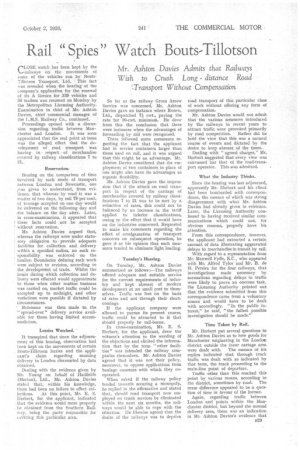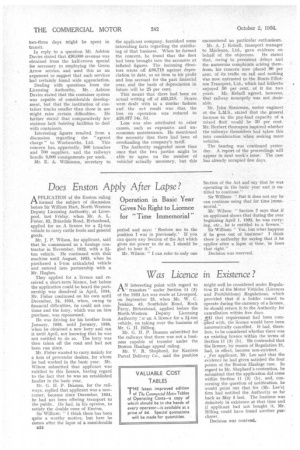Rail "Spies
Page 33

Page 34

If you've noticed an error in this article please click here to report it so we can fix it.
1)
Watch Bouts-Tillotson
Mr. Ashton Davies Admits that Railways Wish to Crush Long distance Road '.Transport Without Compensation
("LOSE watch has been kept by the %.-"railways im the movements of some of the vehicles run by BoutsTillotson Transport, Ltd. This fact was revealed when the hearing of the company's application for the renewal of its A licence for L3Or vehicles and 51i trailers was resumed on Monday by the Metropolitan Licensing Authority. Examination in chief of Mr. Ashton Davies, chief commercial manager of the L.M.S. Railway Co., continued. '
Proceedings opened with a discussion regarding traffic between Man chester and London. It was soon appreciated that the real point at issue was the alleged effect that the de
velopment of road transport was having. in respect, ,of merchandise covered by railway classifications 7 to 21.
Reservation.
Bearing on the comparison of time involved by each mode of transport between London and Newcastle, one ,was given to understand, from evi'deuce, that whereas by road it was a matter of two days, by rail 79 per cent. 'of tonnage accepted on one day would he delivered on the following day and .the balance on the day after. Later, in cross-examination, it appeared that ! these facts could not be accepted ! without reservation.
Mr. Ashton Davies argued that, . whereas the railways were under statutory obligation to provide adequate facilities for collection and delivery within a specified radius, no such responsibility was enforced on the haulier. Boundaries defining such work ' were subject to revision, according to the development of trade. Whilst the hours during which collection and delivery were effected would approximate to those when other routine business was carried on, market traffic could be accepted up to midnight, and other variations were possible if dictated by circumstances.
• Reference was then made to the ." spread-over" delivery service available for those having limited accommodation.
Lorries Watched.
It transpired that since the adjournment of this hearing, observation had been kept on the movements of certain Bouts-Tillotson lorries and the applicant's claim regarding morning delivery in London discounted by data obtained.
Dealing with the evidence given by Mr. Young on behalf of Hadfields (Merton), Ltd., Mr. Ashton Davies stated that, within his knowledge, there had been no failure to effect col lections. At this point, Mr. E. S. Herbert, for the applicant, indicated that the evidence would more properly he obtained from the Southern Railway, being the party responsible for (...oiering this particular area. So far as the railway Green Arrow Service was concerned, Mr. Ashton Davies gave an instance where Roneo, Ltd., dispatched 74 cwt., paying the rate for '20-cwt. minimum. He .drew from this the conclusion that there were instances when the advantages of forwarding by rail were recognized.
There followed some comments regarding the fact that the applicant had in service containers larger than those used on rail, and it was argued that this might be an advantage. Mr. Ashton Davies considered that the employment of two containers in place of one might also have its advantages as regards flexibility.
Mr. Ashton Davies gave the impression that if the attack on road transport in respect of the carriage of merchandise covered by railway classifications 7 to 21 was to be met by a reduction of rates, this could not be balanced by an increase in the tariff applied to inferior classifications, owing to the effect that it would have on the industries concerned. Requested to make his comments regarding the effect of amalgamation of transport concerns on subsequent operation; he gave it as his opinion that such measures tended to eliminate light loading.
! Tuesday's Hearing.
On Tuesday, Mr. Ashton Davies summarized as follows :—The railways offered adequate and suitable service for the current requirements of industry and kept abreast of modern development at no small cost to themselves. Traffic was lost on the basis of rates and not through their shortcomings.
If the applicant company were allowed to pursue its present course, traffic could be attracted to it that should properly be rail-borne.
In cross-examination, Mr. E. S. Herbert, for the applicant, drew the witness's attention to the wording of the objections and elicited the information that by the term "other facilities" was intended the railway companies themselves. Mr. Ashton Davies agreed that it was not their policy, moreover, to oppose applications from haulage concerns with which they cooperated. When asked if the railway policy tended towards securing a monopoly, he replied in the affirmative and stated that, should road transport now employed on trunk services be eliminated within the next six months, the railways would be able to rope with the situation. He likewise agreed that the -desire of the railways was to deprive road transport of this particular class of work without offering any form at compensation.
Mr. Ashton Davies would not admit that the various measures introduced by the railways in recent years to attract traffic were provoked primarily by road competition. Rather did he hold the view that this was a natural course of events and dictated by the desire to keep abreast of the times.
Dealing with "agreed charges," Mr. Herbert suggested that every view' was canvassed bar that of the roadAransport operator. This was admitted.
What the Industry Thinks.
Since the hearing was last adjourned, apparently Mr. Herbert and his client had been bombarded with correspondence, the essence of which was strong disagreement with what Mr. Ashton Davies had already' given in evidence. Later, the Licensing Authority confessed to having received similar communications which could not, for obvious reasons, properly have his attention.
From this correspondence, however, the applicant had extracted a certain amount of data illustrating aggravated delays to merchandise in transit by rail.
With regard to a representation from Mr. Maxwell Fyffe, KC., who appeared with Mr. Alfred Tylor and Mr. B. de H. Pereira for the four railways, that investigations made necessary by accusations regarding delays in traffic were likely to prove an onerous task, the Licensing Authority pointed out that the evidence submitted from this correspondence came from a voluntary source and would have to be dealt with accordingly. "In the public interest," he said, "the fullest possible investigation should be made."
Time Taken by Rail.
Mr. Herbert put several questions to Mr. Ashton Davies as to how goods for Manchester originating in the London district outside the inner cartage area were dealt with. The essence of his replies indicated that through truck traffic was dealt with as indicated by that term, the truck proceeding to the main-line point of departure.
Traffic other than this reached this point by various means, according to the district, sometimes by road. The main difference appeared to be a question of time in favour of the former.
Again, regarding traffic between London and points within the Manchester district, but beyond the normal delivery area, there was an indication in Mr. Ashton Davies's evidence that
two-three days might be spent in transit.
In reply to a question Mr. Ashton Davies stated that £90,000 revenue was obtained from the half-crown special fee necessary to employing the Green Arrow service, and used this as an argument to suggest that such services had certainly found wide appreciation.
Dealing with questions from the Licensing Authority, Mr. Ashton Davies stated that the container system was capable of considerable development, but that the institution of container trucks smaller than those in use might raise certain difficulties. He further stated that comparatively few stations lack hoisting facilities to deal with containers.
Interesting figures resulted from a discussion regarding the "agreed charge" to Woolworths, Ltd. This concern has, apparently, 500 branches and 700 suppliers, and the railways handle 8,000 consignments per week.
Mr. E. A. Wilkinson, secretary to
the applicant company, furnished some interesting facts regarding the stabilizing of that business. When he formed the concern, he found that the fleet had been brought into the accounts at inflated figures. The incoming directors wrote of R86,718 against depreciation to date, as an item in his profit and loss account for the past financial year, and the basis of depreciation in future will be 25 per cent.
This meant that there had been an actual writing off of £63,218. Stores were dealt With in a similar fashion and the net result was that the loss on operation was reduced to £28,877 14s. 5d.
Loss was also attributed to other causes, such as expensive and uneconomic maintenance. He mentioned the necessity that there had been of overhauling the company's tariff.
The Authority suggested more than once that the two parties might be able to agree on the number of vehicles' actually necessary, but this encountered no particular enthusiasm. Mr. A. J. Kelsall, transport manager to IVIacleans, Ltd., gave evidence on behalf of the objectors. He stated that, owing to persistent delays and the numerous complaints arising therefrom, his concern now placed 90 per cent. of its traffic on rail and nothing was now entrusted to the Bouts-Tillotson Transport, Ltd., which had hitherto enjoyed 50 per cent, of it for two years. Mr. Kelsall agreed, however, that railway monopoly was not desirable.
Mr. John Shearman, motor engineer of the L.M.S., stated that the general increase in the pay-load capacity of a mixed fleet would be 20 per cent. 'Mr. Herbert thereupon inquired whether the railways themselves had taken this into consideration when seeking more vehicles.
The hearing was continued yesterday. A report of the proceedings will appear in next week's issue.The case has already occupied five days.




















































































